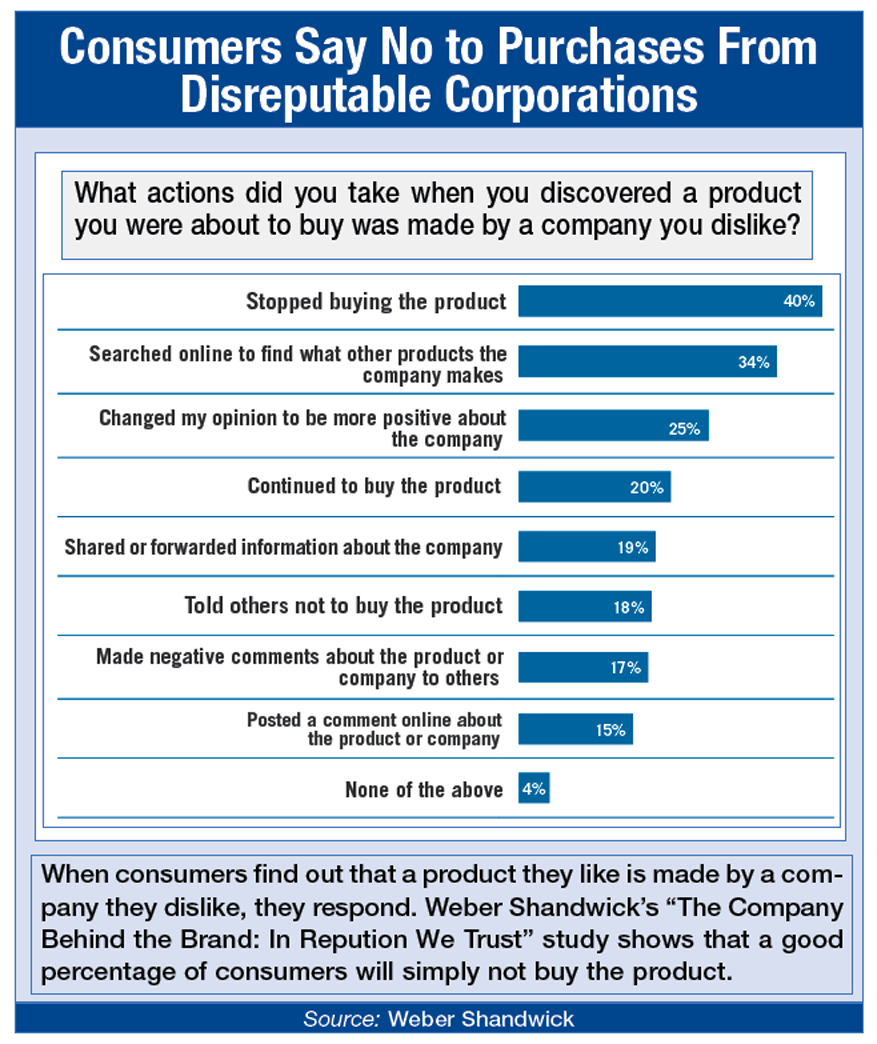 |
An organization’s reputation is firmly linked to product brand success, says Weber Shandwick’s January 2012 study, “The Company Behind the Brand: In Reputation We Trust.”
The survey of 1,375 consumers, and 474 senior executives in companies with revenue of $500 million or more finds that consumers are wary of buying products from disreputable corporate brands: 40% of consumers do not purchase the product when there is a disconnect between the product brand and the corporate brand (see details in the chart).
While this finding should be no surprise to communicators, it is important data to take upstairs to the C-suite to emphasize the importance of reputation protection and enhancement, says Matt Kucharski, executive VP at PR agency Padilla Speer Beardsley.
This disconnect has been prevalent in the B2B space, where customers don’t want to buy “bet your company” products and services from a supplier with a shady background, says Kucharski. “Now it’s certainly true in the B2C world as well, driven both by transparency inherent in today’s social media driven society and by the social activism of the Generation Y buyer.”
Kucharski says the validity of the findings is proven again and again—from gas station closings after BP’s Gulf of Mexico disaster, to a drop in Toyota car sales after its numerous recalls.
What is surprising, says Ann Matheis, brand director for Schlage security systems and locks, is the extent of emotion and intensity that surfaced from consumers’ points of view: When they purchase a product, they equate that action with investing in the parent company. “Consumers say that if a company has a solid reputation for quality, ethical behavior,, they expect the same care will go into the product they are considering,” says Matheis.
INFORMED PUBLIC
The study, continues Matheis, highlights just how informed and how much scrutiny consumers place on company behavior today. “They are not just bystanders in the marketplace, but are active and discerning buyers,” she says.
So how can companies avoid this reputation/brand disconnect? Kucharski says a good reputation starts with “acts that are in the best interests of the audiences important to the company—customers, employees and the community.” That’s what gives PR something to talk about, he says.
Matheis points to the survey’s question to consumers on what sources were influential in their perceptions of companies. Word of mouth topped the list, followed by online reviews and online search. “Companies should understand that the balance of influence might be shifting, where online reviews are gaining more prominence,” says Matheis.
Above all, the Weber Shandwick survey shows that consumers are firmly in charge—a fact that communicators shouldn’t forget. PRN
[Editor’s Note: For more articles on reputation, visit PR News’ Subscriber Resource Center. ]
CONTACT:
Matt Kucharski, [email protected]; Ann Matheis, [email protected].
Follow Scott Van Camp: @svancamp01
